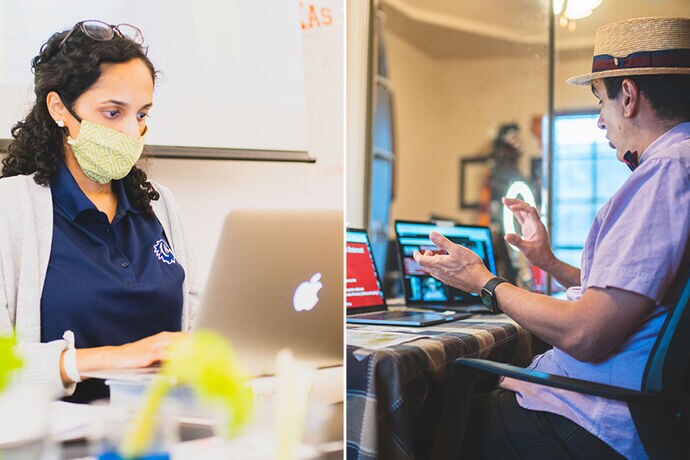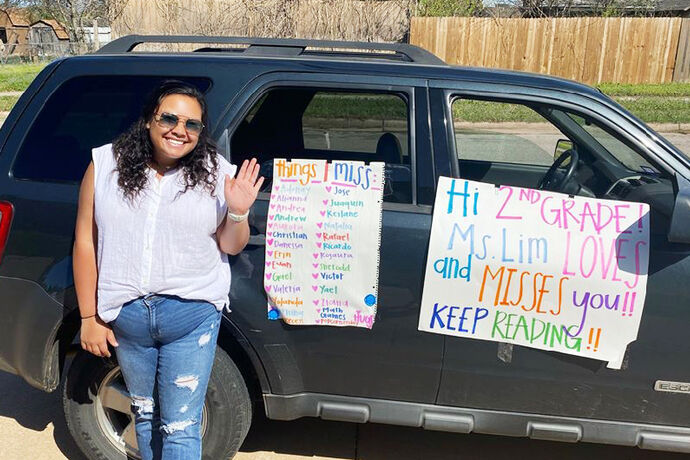National Service Offers Hope for the Future
January 22, 2021
While we’ll remember 2020 as “the year unlike any other,” 2021 is on track to be just as extraordinary. A week into the new year, domestic terrorists threatened our country with an insurrection at our Capitol. The attack was an assault on our democracy, our institutions, and our values—the latest example that white supremacy is an existential threat to our future and our country.
This week, our democracy prevailed, and the transfer of power endured. I was deeply moved by President Biden’s inauguration, where he highlighted “renewal and resolve” as we take on the challenges we face, clear-eyed and hopeful. These past months have reminded us that democracy is fragile, and it needs constant tending. A recent poll by the Harvard Institute of Politics found that nearly two-thirds of young Americans are fearful about the future of democracy in our country.
The challenges we face are indeed immense, and healing will not be simple or quick. But I believe national and community service can play a critically important role in that effort: We can harness the spirit of service to meet this moment and build a more just and equitable future with our children.
I haven’t had to look far to find hope and inspiration. Throughout this global pandemic, so many people continue digging deeper than ever to serve our communities and each other. For almost a year, educators have been teaching in new and ever-changing ways—online and hybrid, over text messages and videos—doing all they can to meet the needs of students in the virtual classroom. They’re going on grocery runs and helping families make ends meet. Healthcare workers, powered by courage, are working around the clock confronting Covid-19 and saving lives. Neighbors are joining together and offering support to carry one another through intense uncertainty. We saw more Americans vote than ever before in a historic election.

The common thread of these actions, and so many others every day, is a commitment to serving our communities and our country.
For decades, national service has proved essential in efforts to address our society’s greatest inequities and answer President Kennedy’s ever-relevant call to “ask what you can do for your country.” Since its founding in 1993, AmeriCorps participants have been working in partnership with communities and fulfilling their pledge to “get things done.”
In a moment like this, their impact is even more important. Since the start of the pandemic, more than 21,400 AmeriCorps members and AmeriCorps Seniors volunteers have stepped up, assisting an estimated 4.4 million people. AmeriCorps members and volunteers are responsible for providing more than 10 million meals to people in need; collaborating with the Centers for Disease Control to support contact tracing; using 3-D printers to make face shields for medical personnel, essential workers, and vulnerable community members; and so much more across education, health, the environment, and economic development.
The partnership of AmeriCorps has made it possible for Teach For America, the largest education program of its kind, to work with students and their families to overcome the systemic barriers to a great education in 350 communities across the country, reaching more than 365,000 students. And AmeriCorps support is key to Teach For America’s success in building one of the largest racially and socio-economically diverse teaching corps in the country. Our partnership reduces the financial obstacles that can deter some of the most exceptional and equity-oriented young people from entering the teaching profession.
In addition to the meaningful impact made in communities by those who commit to national service, it also changes the hearts, minds, and lives of those who serve. They get proximate to the work and build strong and trusting relationships, enabling them to empathize with the experiences of others and bridge divides. At Teach For America, we see this daily, and research confirms it: Teach For America corps members are more empathetic and more likely to recognize the external barriers and unfairness in the economic, social, and political status quo compared to applicants who did not participate in TFA. By forging deep human connections with students and families, Teach For America corps members develop a lifelong commitment to service and equity. Eight in 10 of our nearly 60,000 alumni—going back to our first corps in 1990—work in education or have a career serving a low-income community.

Today, our country has an opportunity to apply national service in new and creative ways. There’s more than enough talent and will in our young people to help solve our current challenges with students’ learning loss, trauma, social-emotional health, and other pressing issues. Whether a new national tutoring corps or expanding support for students and families in need, this is a moment to innovate and break down barriers for young people to directly impact our future.
This week, in addition to celebrating the life and legacy of Dr. King, I’ve been thinking a lot about the late John Lewis, another great American leader who inspires me. He was a leader for all moments, a civil rights icon, a champion of national service, and so much more. His words continue to resonate. “Every generation leaves behind a legacy,” he once wrote. “What that legacy will be is determined by the people of that generation.” He challenged all of us to determine the world we want to leave behind.
Our children are watching, and they will inherit our legacy. My great hope is that together, as a country, we root ourselves in service to them and to each other.


